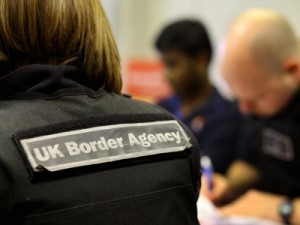A child, a bleeding anus, interrogation by the UK Border Agency
Article published: Thursday, January 19th 2012
In 2010, the last year for which figures are available, just over 1,700 unaccompanied children claimed asylum in this country. A new report from the Office of the Children’s Commissioner, released just this week, exposed a shadowy deal between Britain and France where for 15 years often sick or traumatised children were subjected to instant interrogation once they hit the UK border. Clare Sambrook explains.
 This article was originally published at Our Kingdom
This article was originally published at Our Kingdom
Child B is apprehended after landing in Dover. He is subjected to something called a “welfare interview” and asked “Are you in any pain?” Yes, he says. The little finger on his left hand is in a splint. He is bleeding from his anus. His interrogator writes that Child B has been prescribed “Petadine” by doctors in Belgium. The boy is asked if he wants to see a doctor now in Dover. Yes, he says. But he doesn’t see a doctor. That was just a question on the form.
Despite the pain, the bleeding, the request for medical help (denied), the lack of sleep (he has not slept for more than 24 hours), and the fact that Child B has been prescribed Pethidine (that’s what it is), a drug known to be associated with “euphoria, difficulty concentrating, confusion and impaired psychomotor and cognitive performance”, Child B is subjected to a further interview and then a “Full Screening Interview” upon which the authorities may rely when deciding whether or not to grant him asylum. The interview is conducted through an interpreter by telephone. No legal representative is present.
Child B is asked dozens of questions about how he came to this country, about his biodata and his documents, then a mandatory declaration is read out to him: “I am aware that it is a criminal offence to fail to provide a document establishing my identity and nationality at a leave or asylum interview and/or seek to obtain leave to remain in the United Kingdom by deception. I understand that my fingerprints will now be taken and examined against existing immigration and police databases. I declare that the information that I have given is correct and complete.”
He must sign. When all this concluded, Child B is sent for medical attention to the accident and emergency department of a local hospital.
Let’s stop here. This is not fiction, but real life — as designed by the UK Border Agency — for vulnerable children who may have fled war zones or been trafficked for sexual exploitation. All the quotes are from a new report by Adrian Matthews, Policy Adviser at the Office of Children’s Commissioner for England, published this morning: Landing in Dover, The immigration process undergone by unaccompanied children arriving in Kent.
Why the rush to interview?
Why not wait until an interpreter can be present?
Why doesn’t the child have any legal representative given the fate that might await him if he is sent away?
Here is one reason: if children are interviewed immediately on the day of arrival, those who fail to register a claim for asylum straight away can be sent to France under something called the “Gentleman’s Agreement” that was signed by France and the UK and is dated April 1995.
Gentlemen indeed.
The Gentleman’s Agreement has only now, after 15 years, been exposed by Adrian Matthews.
The Children’s Commissioner, Maggie Atkinson, congratulated the Border Agency’s new chief executive Rob Whiteman on agreeing to stop applying the “Gentleman’s Agreement” to children once it had been “brought to his attention”. But the agreement — which has no legal basis — has been in full view of Border Agency executives for years and still applies to adults and to children deemed by officials to be adults.
Article 3(1) of the United Nations Convention on the Rights of the Child states: “in all actions concerning children, whether undertaken by public or private social welfare institutions, courts of law, administrative authorities or legislative bodies, the best interests of the child shall be a primary consideration”.
Landing in Dover makes one key recommendation: “Interviewing, beyond the gathering of basic identity data, should be postponed until after a child has had a period of some days (or longer if deemed necessary by a childcare professional) to recover from their journey and the opportunity to instruct a legal representative.”
In 2010 (the last full year where data is available) across the whole of the UK there were 1,717 applications for asylum from unaccompanied children. Nobody knows how many children have been returned under the Gentleman’s Agreement nor what became of them.
More: Features, Migration and asylum
Comments
No comments found
The comments are closed.



